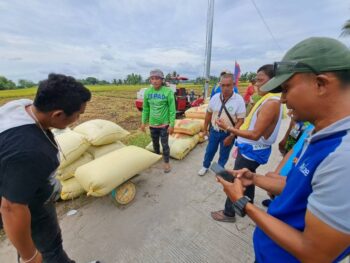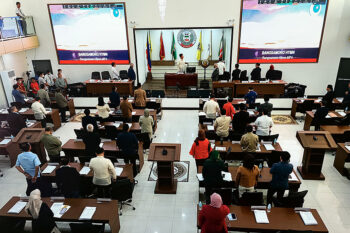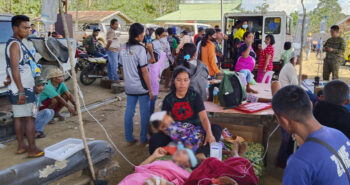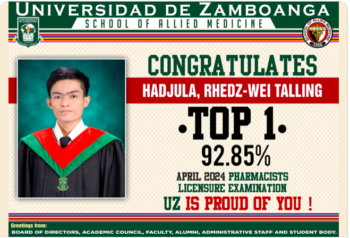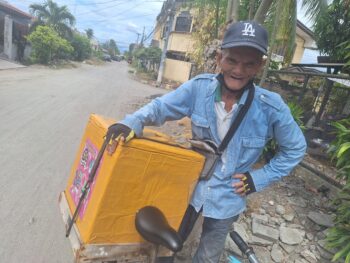
MAKATI CITY (MindaNews / 16 April) Just in my last week’s visit to Cotabato City, an intercultural communication researcher from Japan who purchased a copy of ‘mBayuka Tanu! Maguindanaon Transcription, Translation, and Annotation (https://amzn.to/3uJMjLH) cordially invited me to an after-iftar over-a-cup-of-coffee conversation in a local social enterprise café.
As expected, our chit chat’s opening salvo was the book on Maguindanaon bayuk and her interest in learning the language. I was surprised to know, however, that she was then also reading Kabuntalan Through The Centuries: A Narrative of History and Culture (https://amzn.to/37N9ETp) whose copy she borrowed from the Bangsamoro Regional Library. When I handed her a complimentary copy of my travelogue Light Moments in Vienna (https://amzn.to/3u8DsCM), she was quick enough in pointing out, “Oh, I remember you mentioned this book in ‘mBayuka Tanu,” to which I nodded in agreement, “Yes, I mentioned it in the Prologue.”
Our talk soon segued, or allowed to segue, to such topics as the Bangsamoro Transition Authority (BTA) Parliament’s performance, the upcoming local elections in Cotabato City and Maguindanao, and the growing concern over the probable impact of the presidential race’s outcome upon the future of the autonomous government in transition.
After mentioning the Mamalu and Tabunaway legend and expressing sympathy toward indigenous peoples, as a whole, the Japanese professor asked, “How do you think should the Moro-Lumad relationship be officially written?”
I smiled and told her, “You see, just last month, some colleagues in the academe asked me to comment on a proposed decolonial study about the notion of the Lumads’ exclusion in the Bangsamoro peace process.”
Decolonial Theory’s Pluriversality
Questioning the positivism and universalism perpetuated by the West, Pluriversality is the notion of multiple worlds coexisting simultaneously, while recognizing the plural ways of knowing and being in the world. Emerging from the Decolonial Theory, Pluriversality is rooted in the modernity/coloniality framework of Anibal Quijano who argues that modernity (capitalism, globalization, and Enlightenment) achieved its hegemonic status through centuries of European systemic oppression of the non-European world (coloniality).
In its decolonial pursuit for emancipation, the concept of Pluriversality posits the existence of multiple ontologies and epistemologies. On the ontological dimension, it acknowledges that more than just the plurality of perspectives in one world, there are multiple worlds in which there are multiple ways of being, doing, sensing, and thinking.
On the epistemological side, it assumes that each of the worlds within the pluriverse has a particular knowledge system existing adjacently to one another, which in turn informs the diverse inhabitants’ multiple ways of being, doing, sensing, and thinking, and subsequently, their relations and interactions.
The Notion of the Lumads’ Exclusion
Using this Pluriversal framework, the proposed study argues that “Despite also being indigenous to the region, and thereby having just as much of a stake in the land, Lumads have been largely excluded from the Mindanao peace process: in negotiations and agreements with both the Moros and the communist insurgents.”
It is even claimed that “The Lumads have never been a party in any of the Bangsamoro peace negotiations and were reportedly coerced into giving their support for the creation of the BARMM.”
It goes on alleging further that “Because of their political weaknesses, the Lumads fear that the Moros might try to assimilate them further and that they would be pressured to convert to Islam or otherwise lose their cultural identity, along with their ancestral lands.”
Points of Dissection
“Here are some of the points I raised when interrogating the proposed study,” I told the sabbatical professor as we were savoring our espresso coffee and munching walnut craft cookies:
1. Two Distinct Subaltern Worlds. “Although in theory you recognize that the Moros are also indigenous peoples, in some parts of your paper, you tend to forget it. For example, you diagrammatically represented the Moros and Lumads as two distinct subaltern worlds without any intersection, whereas in fact, the Moros are Lumads. The only distinction is that the former embraced the Islamic faith. From this perspective, the Moro is a subset of the Lumad.”
2. By Ascription, Not Religious Affiliation. “And, by the way, which peace process documents have you read in toto? Memorandum of Agreement on the Ancestral Domain (MOA-AD)? Bangsamoro Basic Law (BBL)? Framework of Agreement on the Bangsamoro (FAB)? Comprehensive Agreement on the Bangsamoro (CAB)? Bangsamoro Organic Law (BOL)? You see, you’re largely relying on others citing these documents here and there. In fact, Article II, Section 1 of the BOL defines ‘Bangsamoro People’ with these words: ‘Those who, at the advent of the Spanish colonization, were considered natives or original inhabitants of Mindanao and the Sulu archipelago and its adjacent islands, whether of mixed or full blood, shall have the right to identify themselves, their spouses and descendants, as Bangsamoro.’ As such, contrary to our common assumption that ‘Bangsamoro’ is an identity based on religious affiliation, this provision provides for an identity on the basis of voluntary ascription. From this perspective, the Lumad can be a subset of the Bangsamoro.”
3. Lumping Together as ‘Lumad’. “It can also be observed that contrary to your diagrammatical representation of ‘Lumad’ as having their indigenous belief system in contradistinction to the Bangsamoro with their Islamic belief system, what you do not disclose is the fact that a considerable number, if not the majority now, of these Lumads have already embraced Christianity. Yet, you still lump them together as ‘Lumad, and you see it as just ‘normal’ because, wittingly or unwittingly, it is something ‘familiar’ to the Westphalian tradition, which you claim you’re endeavoring to be emancipated from.”
4. One Territory, Many Ancestral Domains. “In the 2017 Philippine Anthropological Association International Conference held in Cagayan de Oro City, Mohagher Iqbal, who was then the Chair of the Bangsamoro Transition Commission, was a keynote speaker. When asked about the issue of the Lumads’ ancestral domain in the Bangsamoro territory, he said to the effect that one territory does not necessarily mean just one ancestral domain; rather, one territory, many ancestral domains.”
5. Special Law within Another Special Law. “When asked about the status of the IPRA (Indigenous Peoples Rights Act) in the BBL, Iqbal said to the effect that the BBL will be a special law while IPRA is another special law, and the lawyers among the audience could explain the implication to the spirit of autonomy of a special law if another special law is put into it.”
6. Consistency in Showing. “Your show of sympathy and concern for the plight of the Lumads in the Bangsamoro peace process is commendable. But why don’t you show the same consistency with respect to the Kaagan of Davao, the Sangil of Sarangani, the Kulibugan of Zamboanga, the Jama Mapun and Palawani of Palawan, and the Maguindanaon of Sibugay and South Cotabato, among others, whom you acknowledged to be Moro Lumads as well, and yet they are booted out of the area of the Bangsamoro autonomy?”
7. Territorial Contiguity. “This point is connected also to my previous question about the other Moros. You see, what the government can offer for the resolution of the conflict is autonomy or self-government, which in turn necessitates a particular geographical territory. And when we say geographical territory, it necessitates contiguity, for all practical purposes. You can’t just imagine the difficulties of a non-contiguous territory. And this is a reality cognized by both parties in negotiation.”
8. Peace Process Timeline. “In your proposed study, you seem to limit the peace process timeline to just the negotiation and signing of an agreement. This is while in conflict resolution studies we are told that ‘peace process’ technically starts when the parties to a conflict start to find ways to resolve it. In fact, war is nothing but a violent way of resolving a conflict. Having said this, don’t you know that many Lumads did take active role in the armed struggle? Don’t you know that at least one Lumad was a member of the Moro Islamic Liberation Front’s (MILF) Central Committee? Don’t you know that during the decades-long negotiations with the government, the MILF had always a Lumad member of its negotiating party? And in the current Bangsamoro government setup, don’t you know that the Lumads have their own specific office and representation in the Parliament? I dare you to visit the Bangsamoro Government Center in Cotabato City and observe them by yourselves.”
9. Pluriversal Exclusion. “Finally, let’s deal with the elephant in the room. It can be recalled that from your Pluriversal perspective, “there are multiple worlds (ontologies) in which there are multiple ways of being, doing, sensing, and thinking (epistemologies).” Keeping this in mind, it can be said that your alleged exclusion of the Lumads in the Bangsamoro peace process is only true in your own world (ontology) in your own particular way of thinking (epistemology), and it is NOT ‘exclusion’ at all in other ontologies and epistemologies!”
“On hindsight, this is the risk of adopting an extreme ontological subjectivism and epistemological non-foundationalism. While referring to it as ‘mosaic epistemology’, Raewyn Connell (2018) cautions against such tendencies toward radical proliferation and epistemological relativism. As a result, far from being emancipated from, you end up continually stuck up in the quagmire of modernity and Westphalian tradition,” I added.
“Now, going back to your question on how the Moro-Lumad relationship should be officially written, I’m sure the elders of both the Mamalu and Tabunaway will keep their brotherhood and kindship,” I concluded.
As Lady Agaton was constantly asserting her nightly presence through its heavy downpour and windy touches, the lady professor and I decided to call it a day and continue the conversation via emails and exchange of links to my MindaNews column articles and other relevant materials.
[MindaViews is the opinion section of MindaNews. Mansoor L. Limba, PhD in International Relations, is a writer, university professor, blogger, chess trainer, and translator (from Persian into English and Filipino) with tens of written and translation works to his credit on such subjects as international politics, history, political philosophy, intra-faith and interfaith relations, cultural heritage, Islamic finance, jurisprudence (fiqh), theology (‘ilm al-kalam), Qur’anic sciences and exegesis (tafsir), hadith, ethics, and mysticism. He can be reached at mlimba@diplomats.com, or http://www.mlimba.com and http://www.muslimandmoney.com, and his books can be purchased at www.elzistyle.com and www.amazon.com/author/mansoorlimba.]


